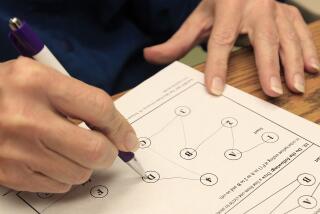Bright Idea for a Fairer SAT
- Share via
The SAT has long held itself to be a hallmark of equal opportunity in the U.S. education system, but earlier this year its reputation was tarnished by statistics showing that some parents have learned to manipulate testing rules to gain an advantage for their children. In recent years, the statistics show, the number of students who claim a learning disability to get extra time to complete the SAT has shot up by more than 50% and the rise is concentrated in enclaves of the rich and savvy.
State Sen. Richard Alarcon (D-Sylmar) has come up with a surprisingly elegant solution: a bill that would require the College Board, rather than local high schools, to determine which students have disabilities that qualify them for extra time on the test.
The nub of the problem is that a small minority of parents appears to be shopping around among psychologists until they find one willing to write up a desired diagnosis. After that, they return to school to press their demands, occasionally with a disability advocate in tow to threaten legal action under antidiscrimination laws.
Many high schools too readily accede to such demands. By contrast, the College Board, which administers the SAT, has long used science-based criteria to distinguish thinly rationalized disability claims from legitimate ones. For example, students with a well-documented school history of dyslexia are viewed as eligible for extra time on the test.
SAT critics like New Yorker writer Nicholas Lemann, whose new book “The Big Test” recounts the SAT’s history, say no amount of tinkering with the test’s administration can make the test fair to all students. Lemann points out that even the Princeton psychology professor who designed the test in 1926 admitted that it measures social factors like schooling and family background far better than it does native intelligence. These critics want the test replaced by end-of-year exams based on rigorous state or national curricula.
States like California and New York are slowly moving toward such standards, but the SAT will no doubt remain a key steppingstone to opportunity for years to come. Alarcon’s bill, though only a partial solution, would considerably improve the test’s fairness.
More to Read
Sign up for Essential California
The most important California stories and recommendations in your inbox every morning.
You may occasionally receive promotional content from the Los Angeles Times.













